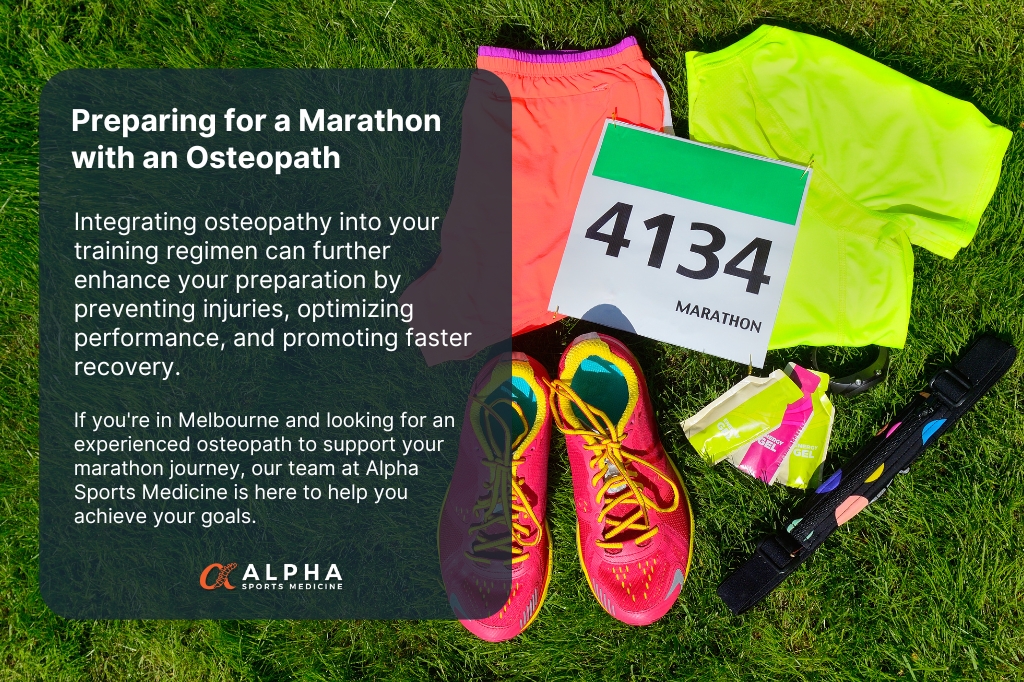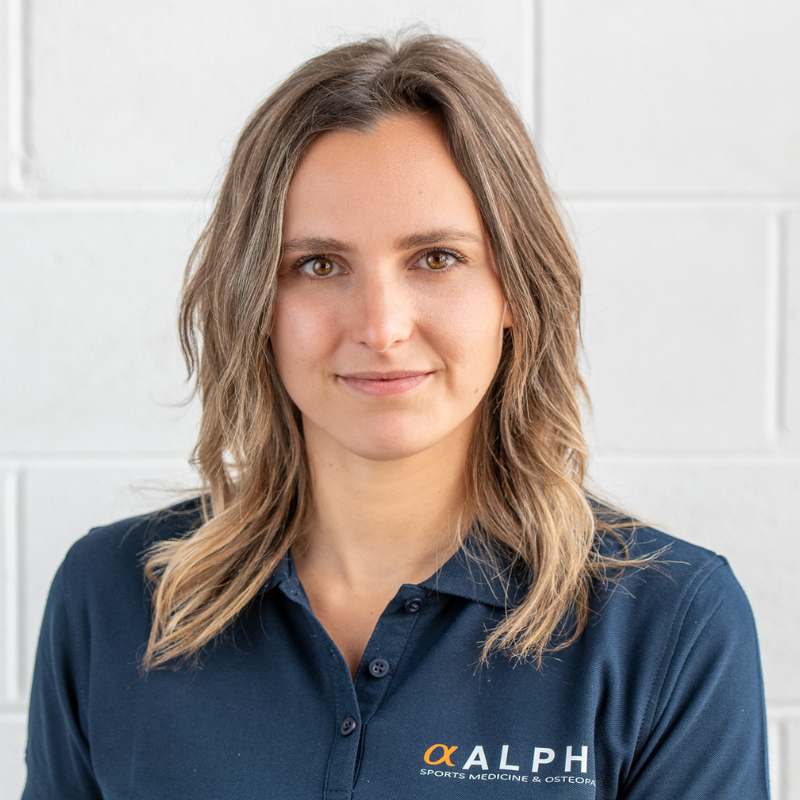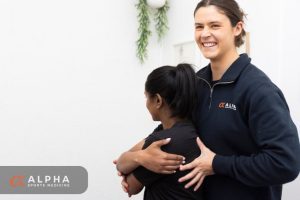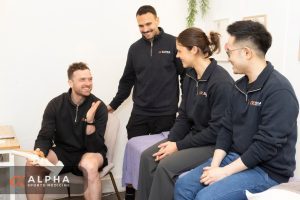Training for a marathon is a significant commitment that requires careful planning, discipline, and dedication. Whether you’re a seasoned runner or a first-timer, preparing for this endurance event can be both physically and mentally challenging.
Our team at Alpha Sports Medicine know all about running, we have many runners amongst our team who know how to help maximize your performance and minimize the risk of injury.
In this blog post, we’ll explore comprehensive marathon preparation tips and explain why integrating osteopathy into your training routine can be a game-changer.
Setting the Foundation: Key Steps for Marathon Preparation
1. Create a Training Plan
Developing a structured training plan is crucial for marathon success. Your plan should gradually increase in intensity and mileage to build your stamina and endurance while allowing ample time for recovery. Most plans range from 12 to 20 weeks, depending on your fitness level and running experience.
Our Osteopaths at Alpha Sports Medicine in Newport, Ascot Vale and Bacchus Marsh can help design a running plan that is tailored to your goals. In this plan, you should incorporate a mix of long runs, speed work, tempo runs, and easy runs to ensure a well-rounded approach.
2. Focus on Nutrition and Hydration
Fueling your body with the right nutrients is essential for peak performance. A balanced diet rich in carbohydrates, proteins, healthy fats, and vitamins will provide the energy needed for long runs and aid in muscle recovery. Hydration is equally important, as dehydration can significantly impact your performance and recovery. Aim to drink water consistently throughout the day and consider electrolyte supplements during long runs.
3. Strength Training and Cross-Training
Incorporate strength training and cross-training exercises into your routine to improve overall fitness and reduce the risk of injury. Strength training helps build muscle strength and stability, particularly in the core, legs, and hips. Cross-training activities like cycling, swimming, or yoga can enhance cardiovascular fitness and provide a break from the repetitive impact of running. Our team of running experts can help Coach and Program your strength training via our Coaching App where you can get a personalized program as well as regular check-ins.
4. Prioritize Rest and Recovery
Rest and recovery are just as important as your training sessions. Adequate sleep, rest days, and active recovery techniques (such as stretching and foam rolling) help your body repair and adapt to the increased demands of training. Overtraining can lead to burnout and injuries, so listen to your body and adjust your plan as needed. We recommend regular body tune-ups with our Alpha unique Sports Therapy or Myotherapy to keep your body recovering.
5. Mental Preparation
Running a marathon is as much a mental challenge as it is a physical one. Develop mental resilience by practicing visualization techniques, setting realistic goals, and maintaining a positive mindset. Mental toughness will help you push through challenging moments during the race.
The Role of Osteopathy in Marathon Training
While the steps above are crucial for marathon preparation, integrating osteopathy into your routine can provide additional support and optimize your performance. Here’s why you should consider seeing an osteopath:
1. Injury Prevention and Management
Osteopaths are trained to identify and treat musculoskeletal imbalances and dysfunctions. Through hands-on techniques such as joint manipulation, soft tissue massage, and stretching, osteopaths can address areas of tension, weakness, and misalignment. This proactive approach can prevent common running injuries such as shin splints, IT band syndrome, and plantar fasciitis.
2. Enhanced Recovery
Regular osteopathic treatments can enhance your body’s natural healing processes and improve recovery times. Techniques that increase blood flow, reduce inflammation, and release muscle tension can help you recover more quickly between training sessions, allowing you to maintain a higher level of performance.
3. Optimized Performance
Osteopathy isn’t just about treating injuries – it’s also about optimizing your overall performance. By improving joint mobility, muscle flexibility, and biomechanical function, osteopathic treatments can enhance your running efficiency and reduce the energy expenditure required for each stride. This means you can run faster and more comfortably for longer distances.
4. Personalized Care
Every runner’s body is different, and osteopaths provide personalized care tailored to your specific needs and goals. During an initial assessment, an osteopath will evaluate your posture, gait, and movement patterns to identify any areas of concern. Based on this assessment, they will develop a customized treatment plan to address your unique requirements and support your marathon training.
5. Holistic Approach
Osteopathy takes a holistic approach to health and well-being, considering the interconnectedness of the body’s systems. This comprehensive perspective can be particularly beneficial for marathon runners, as it addresses not only the physical aspects of training but also factors such as nutrition, hydration, and mental health.
Conclusion
Preparing for a marathon is a multifaceted journey that demands careful planning, dedication, and support. By following a structured training plan, focusing on nutrition and hydration, incorporating strength and cross-training, prioritizing rest, and developing mental resilience, you can set the foundation for a successful marathon experience.
Integrating osteopathy into your training regimen can further enhance your preparation by preventing injuries, optimizing performance, and promoting faster recovery. If you’re in Melbourne and looking for an experienced osteopath to support your marathon journey, our team at Alpha Sports Medicine is here to help you achieve your goals.
To schedule a consultation or learn more about our services, contact us today. Let’s work together to help you Unlock your Potential, and cross the finish line with confidence.
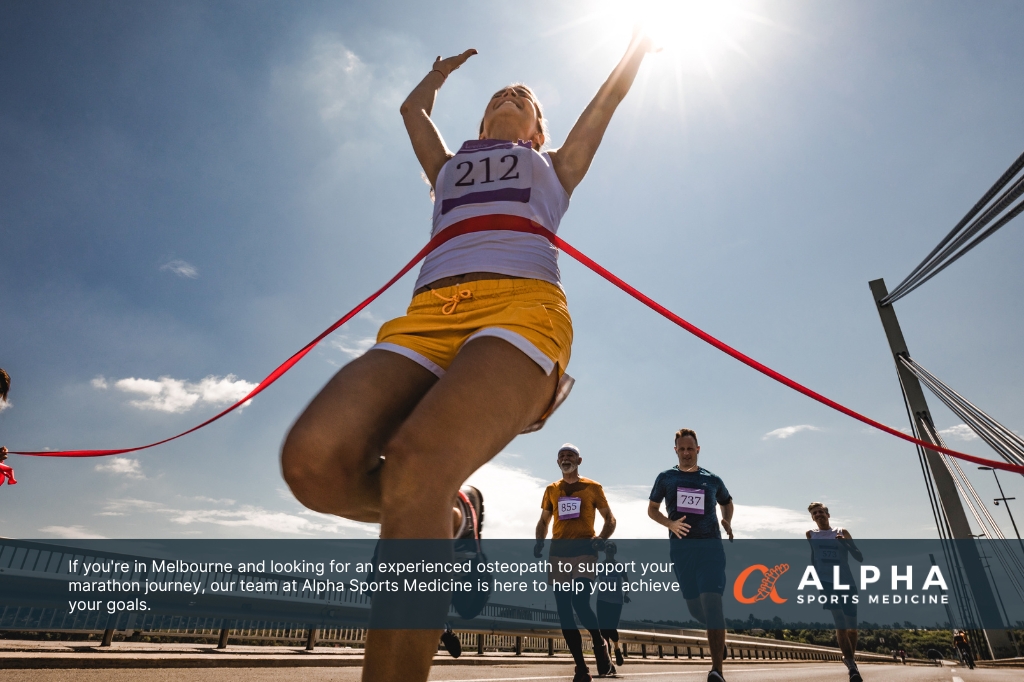
Author
-

Dr. Ashton Wilson began her studies with a three year Bachelor of Biomedical Science, where she majored in Anatomy and Physiology. She then switched to a more hands on approach, where she completed a three year Bachelor of Clinical Science and a two year Masters of Osteopathy. Ashton has since completed further education and is a qualified Strength and Conditioning Coach as well as a Kinetic Link Trainer.
View all posts


